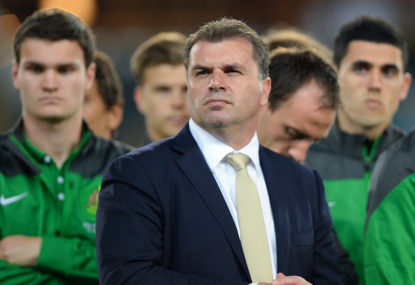If there were any reservations about where Australia stands in international football, Japan laid such questions to rest in a supercharged 45 minutes in Osaka on Tuesday night.
A first-half façade of first-gear play from the Japanese preceded a second-half onslaught that will have even the most optimistic of Socceroos fans downgrading their Asian Cup expectations.
Sure, Australia flaunted a handsome amount of comfort and control initially, but when the Samurai decided to play – and play they did – Postecoglou’s men were outclassed to the point where a 2-1 defeat was perhaps ultimately flattering and certainly kind.
Played in front of a throbbing 47,000 capacity crowd at Nagai Stadium, the match marked the 22nd meeting between the two nations, and the Socceroos’ ninth consecutive match on foreign soil.
Oh, how the Socceroos will be longing for the comforts of home. Of those nine matches, there have been seven losses, one draw and a solitary win against Saudi Arabia in London.
Granted, this was a Japan who have never conceded defeat to Australia at home, a Japan who were coming off a 6-0 thumping of Honduras over the weekend, and a Japan who will head into January’s Asian Cup as both reigning champions and surefire favourites.
Though such reassurances will do little to quell the reoccurring concerns of the Socceroos.
Postecoglou made six changes to the line-up that fell to Qatar, as we got our first look at a roaming and somewhat narrow front three of Robbie Kruse, Mathew Leckie and James Troisi.
With no number 10 in the 4-3-3 system, impetus from midfield would be crucial, and there was certainly some positive link-up play from the supporting duo of Matt McKay and Massimo Luongo in the opening stanza.
Even more promising, was the on-ball assurance of captain Mile Jedinak – a quality that has been severely lacking from the skipper in recent outings.
Yes, Japan sat back. Yes, the Socceroos weren’t carving out many chances. But there was reason enough to feel that with a few more carefully selected options, the Japanese rearguard could be broken.
How misleading football can be.
In the second half, new boss Javier Aguirre tweaked his system and implemented a pressing game that jolted the boys in gold into submission.
The space and possession that was afforded to the Socceroos was gone, and with it all signs of composure and structure.
The Australian back four, who up until then had limited the thrust of the Japanese attack, was suddenly infested with holes and indecision in equal measure.
It was the sort of pressure that would lead to a calamitous example of set-piece defending for the opening goal, as Yasuyuki Konno was left alarmingly free to head home at the far post.
Japan continued to be better in almost every way and there was little surprise when Okazaki finished deftly past an exposed Maty Ryan.
Just as the Socceroos were on the verge of registering their fifth goalless 90 minutes in six matches, Tim Cahill, Australia’s greatest ever goalscorer, came off the bench for his customary goal – his 19th headed finish for the Socceroos.
Yet it’s a goal that brings about just as much frustration as it does awe – of the 12 goals scored during Postecoglou’s reign, eight of those have come from Cahill; a frightening disparity no doubt.
More worrisome is the fact that there will be no more trial runs before we welcome Asia’s finest next year. Postecoglou finds himself out of opportunities to experiment, to scout, to trial and to test.
When Aaron Mooy came on deep into the second-half, he became the 22nd player to be used by the boss. Postecoglou now fully knows what he has it disposable, yet the whiteboard is now the only place where he’ll be able to play out his permutations.
That’s a major concern, one would think, given that the Socceroos’ starting line-up still remains rather unsettled and undecided. Of the fringe players that took to the field on Tuesday night, not many will be able to lay claim to a good shift.
Massimo Luongo might disagree – the youngster was sprightly in his time on the pitch, showing the sort of foresight that the Socceroos will need when breaking down teams at home in the Asian Cup.
Once upon a time, I was fortunate enough to play alongside Massimo in the NSW Schoolboys team. Even as a 17-year-old, he was millenniums ahead of the rest in terms of his economy and intelligence on the ball.
Deceptively creative, his ability to weave out of harm’s way was matched only by his penchant for Harry Potter quotes (seriously). I would’ve liked to see him play out the 90 minutes, though it wouldn’t have counted for much considering the insurmountable control Japan exerted thereafter.
What we can now take away from the game is the glaring realisation of the task that the Socceroos will be facing in 51 days’ time.
Building for the future is a must, and forging a style of play that’s easy on the eyes is a prospect craved by all, but it counts for little when there’s silverware to be won.
Come the Asian Cup, there won’t be any points for performance.





























































































